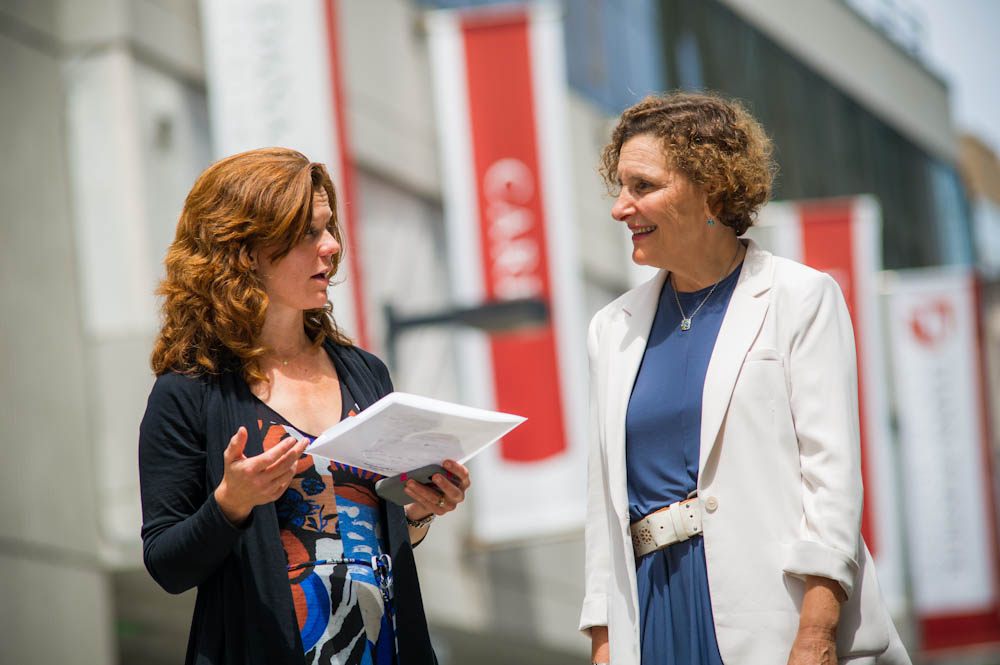November 10, 2015 / by Dana-Farber
By Lisa Diller, MD
While recent research shows improvement in long-term survival rates for childhood cancer patients, challenges remain for many of the almost 400,000 survivors in the United States. Among the long-term survivors are women facing gynecological health issues from the late effects of their treatment. There are a number of health concerns women should consider if they had childhood cancer.

Survivorship experts Ann Partridge, MD, MPH, (left) and Lisa Diller, MD, (right). Partridge is the director of Dana-Farber’s Adult Survivorship Program and Diller is the medical director of the David B. Perini Jr. Quality of Life Clinic for childhood cancer survivors.
1. Treatment summary
Women who had childhood cancer should give their obstetrician/gynecologist a summary of the treatments they received. Many therapies used for childhood cancer treatment — including radiation to the chest or pelvis, some kinds of chemotherapy and bone marrow transplants – have gynecologic or obstetric late effects. Women who don’t have a treatment summary should try to get one from the center where they received care. Otherwise, academic medical centers that treat childhood cancer patients often have dedicated survivorship programs. In addition, some community-based medical or radiation oncologists will see a patient for a survivorship visit. Ob/gyns and other physicians can find peer-reviewed guidelines for the care of cancer survivors at survivorshipguidelines.org.
2. Ovarian function and fertility
Women who were treated with high-dose alkylating agents are at risk of ovarian failure, early menopause and/or infertility. Some women who received this chemotherapy as a child may menstruate regularly in their late teens and 20s and then go into menopause at a very young age. Therefore, women treated with alkylating agents may want to investigate egg preservation and seek counseling about when to consider pregnancy. Research that my colleagues and I published in Lancet Oncology found that many survivors of childhood cancer eventually become pregnant, although it may take them longer than other women of the same age. Thus, women who had childhood cancer should see a fertility specialist after no more than six months of trying unsuccessfully to get pregnant. Women treated with high cumulative doses of alkylating agents or pelvic radiation should see a fertility specialist even earlier in their efforts to conceive.
3. Pregnancy
Women who had childhood cancer are at risk of heart disease if their treatment included chemotherapy from a family of drugs known as anthracyclines. This risk may increase during pregnancy, with research linking exposure to anthracyclines with the development of congestive heart failure during pregnancy or the peripartum period (last month of pregnancy through six months post-partum). Risk factors for developing congestive heart failure years after cancer therapy ends include a history of congestive heart failure during treatment, young age at exposure to these drugs or high total dose, and radiation to the chest. Women with risk factors should talk to their ob/gyn about getting an echocardiogram before pregnancy, and should consider being seen by a cardiologist or high-risk obstetric practice with expertise treating cancer patients and survivors.
4. Breast health
Women with a history of chest radiation in childhood or early adolescence are at very high risk of developing breast cancer. These women should start mammography and breast MRI screening at age 25 or eight years after exposure, whichever comes later. They should consider consulting a physician in a breast cancer prevention program; programs for women at high risk of breast cancer are available at many large cancer centers and major hospitals.
5. Bone health
Women treated for childhood cancer should have an early assessment of bone health because they may be at risk for osteopenia and osteoporosis even if they are menstruating or receiving estrogen replacement therapy. The reasons for poor bone mineralization include inadequate calcium intake and lack of exercise and sun exposure during their illness, and inadequate estrogen production, during or after the cancer treatment.
Understanding the possible late effects of their treatment for childhood cancer can help women act to mitigate potential harm and enjoy a good quality of life for years to come.
Lisa Diller, MD, is chief medical officer of Dana-Farber/Boston Children’s Cancer and Blood Disorders Center and director of the David B. Perini Jr. Quality of Life Clinic for survivors of childhood cancer.
